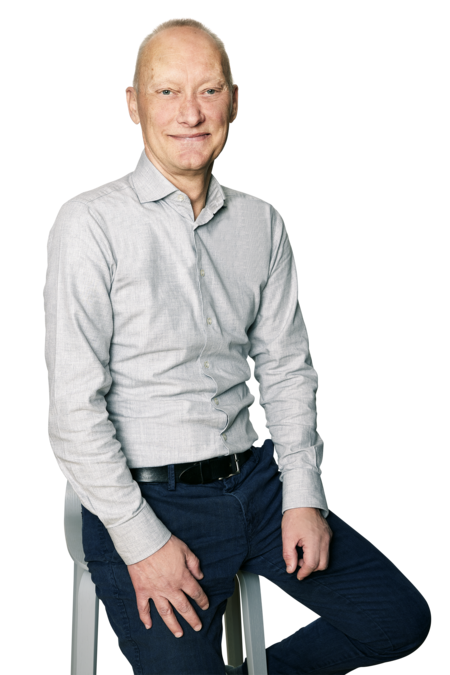Strong collaboration between research and practice in new grants from VELUX FONDEN: From constructive climate journalism to homeless initiative

Concrete solutions to current societal challenges. That is the aim for the research projects supported through the HUMpraxis programme at VELUX FONDEN. One of the five projects that has just received funding deals with climate journalism. Media on Funen will become a living laboratory that will test out whether more solution-oriented journalism motivates viewers and readers to do something for the climate.
The way things are now, the frequent bad news can cause listeners to lose any hope of being able to make a difference:
About HUMpraxis
The HUMpraxis programme focuses on finding concrete solutions to current societal challenges through collaboration between researchers from the human and social sciences and practitioners from the environment and social fields, or transition to adulthood and changes. The HUMpraxis programme thereby draws VELUX FONDEN’s various grant areas together.
The goal is to create original research results and translate them into sustainable solutions that can promote a democratic and sustainable society built on an informed and inclusive foundation.
HUMpraxis 2023
VELUX FONDEN has received 92 expressions of interest for this year’s HUMpraxis field of applicants. The five projects awarded grants have been selected from the 14 projects that were invited to submit a full application based on their expressions of interest, for evaluation by external experts. The five projects will receive a total of DKK 28 million.
“A one-sided focus on disasters and serious consequences in coverage of the climate crisis can be very discouraging for receivers, because fear of how things will end can leave people paralysed. They need to believe that they are capable of acting and that their actions will make a difference. We will therefore investigate how news coverage can highlight positive cases and possible solutions, and contribute to more climate-friendly behaviour among citizens,” explains Morten Skovsgaard, Professor with Special Responsibilities, from the Centre for Journalism at the University of Southern Denmark.
The idea is that a different and more constructive coverage of the climate crisis can bridge the gap between citizens' opinions and actions. Fyens Stiftstidende and TV2 Fyn, together with consulting firm Room of Solutions, will be responsible for the constructive angle on climate coverage in practice.
The project on climate journalism is well aligned with VELUX FONDEN's vision of working to empower people in a democratic and sustainable society. As are the four other HUMpraxis projects in the social sphere. These are all about empowering people in various ways – whether working as a volunteer with homeless people, welcoming people with anxiety at a pharmacy, being part of an ethnic minority at an upper secondary school or working with social counselling services. The projects all focus on creating new knowledge and solutions to current challenges in society:
“The HUMpraxis programme is quite unique. The aim is to support long-term, mutually respectful and interactive collaboration between research and practice to address specific challenges. The two branches can thereby shape each other, so that the knowledge gained is translated into concrete changes and solutions in practice. This will allow the research to have a much more direct impact in society,” explains Henrik Tronier, Programme Manager for VELUX FONDEN's grant area within humanities and social sciences.
The five new projects will receive grants totalling DKK 28 million.
Volunteers' efforts in Housing FirstOne of the other projects for this year will work with volunteer network friends for the homeless. Homeless citizens are offered support from professional support workers in the transition to living in their own home, but this is not always enough. The volunteer network friends can complement the efforts of the support workers and help the homeless person establish a home, thrive in the local area and retain their new home.
“Homeless people often have complex social problems and experience loneliness and social isolation, which can make it difficult for them to enjoy a good life in their own home. But volunteer network friends can help,” says Associate Professor Catharina Juul Kristensen from the Department of Social Sciences and Business at Roskilde University, who is the head of research on the project.
The volunteers and the homeless persons meet each other as equals who have chosen to build a friendship. This provides a unique basis for addressing loneliness and social isolation. But the Homeless Reform of 2023 places new demands on housing support work in shelters and in municipalities. The goal is for homeless citizens to only stay in a shelter for three months before being offered housing. This means less time than previously to support them and prepare them for life in their own homes. This is not without problems, because involving volunteers in the support work does not happen by itself, Catharina Juul Kristensen notes.
It is therefore both relevant and important to develop new methods for involving the volunteers in the work of building a meaningful life for the formerly homeless persons, and countering the loneliness that can arise when living alone.
Conversation in focusThe third of this year's projects under the HUMpraxis programme, RÅDVILD, focuses on the use of the more than 175 counselling services available to citizens in vulnerable life situations. The fourth project, ‘How to talk about medicine’, will focus on how pharmacies can become a comfortable place for citizens with anxiety and depression to visit. The last project, ‘Cross-cultural communities’, will explore opportunities for promoting community between young people with ethnic minority and majority backgrounds in upper secondary school. The five projects are further described below.
Read more about the five new HUMpraxis projects:Grantee: Morten Skovsgaard, Professor, Department of Political Science, University of Southern Denmark
Grant: DKK 5,440,155
The climate crisis requires action, not just politically, but also from citizens who need to become more climate-friendly. While the focus in the news media on terrifying future scenarios and serious consequences helps create awareness of the climate crisis and fear of the consequences, it also leaves many people feeling that they cannot do anything to change the problem, so they simply become passive and disillusioned. The aims of GRO are therefore to: 1) Develop new constructive and solution-oriented journalism and test whether it makes the receivers feel more able to act and can motivate them to become more climate-friendly. 2) Investigate whether this type of journalism can be reconciled with journalists' professional values, such as being society's critical watchdog and objective. This will be investigated in close collaboration between the University of Southern Denmark and the local news media. The latter will be transformed into a living laboratory for constructive climate journalism.
The project is being carried out jointly by the Centre for Journalism at the Department of Political Science, University of Southern Denmark, TV 2 Fyn, Fyens Stiftstidende and the Room of Solutions consultant agency.
Grantee: Catharina Juul Kristensen, Associate Professor, Department of Social Sciences and Business, Roskilde University
Grant: DKK 5,698,816
This project will investigate and enhance the involvement of volunteers in the municipal Housing First
initiative for homeless people, in the transition to having their own homes, through method development and research. The new homeless reform of 2023 places new demands on support work and on the involvement of volunteers in this difficult transition for homeless persons. Under the reform, homeless people are only allowed to stay in a shelter for three months. Prior to the reform, there was ample time in shelters to help homeless people move on and involve volunteers in the work. Today, support is primarily provided by municipal housing support workers and takes place in the homes of formerly homeless people. This places great demands on the support staff and on the volunteers – and means new methods must be developed for involving volunteers in the work. The project is being carried out in collaboration with three municipalities. It is the joint initiative of WeShelter (Fonden Missionen Blandt Hjemløse) and a research team from Roskilde University. The aim is to help build a meaningful life for the homeless in their own homes, reduce homelessness and loneliness, and create basic scientific knowledge about this.
The project is being carried out in collaboration with the Department of Social Sciences and Business at Roskilde University and WeShelter.
Grantee: Anni Marquard, head of the self-governing institution, Centre for Digital Youth Care
Grant sum: DKK 5,700,000
The RÅDVILD project is a collaboration between the Centre for Digital Youth Care, Aarhus University and RådgivningsDanmark, and is led by a steering committee consisting of Anni Marquard (CfDYC), Carsten Stage (AU) and Trine Nyby (RD). The project has three central aims: 1) to create a nuanced understanding of how and why many users of mediated counselling services become 'regular users', who contact the services frequently and without signs of progression, 2) to identify when regular use as a communicative practice is perceived as problematic by counsellors and/or users, and 3) to develop communicative initiatives to address the ‘problematic regular use' in constructive new ways. The project will provide a significant contribution to research into ‘frequent calling’ and the importance of media in relation to vulnerability and crises.
The collaboration partners are the Department of Communication and Culture at Aarhus University and the RådgivningsDanmark sector association.
Grantee: Christina Fogtmann Fosgerau, Professor, Department of Nordic Studies and Linguistics, University of Copenhagen
Grant: DKK 5,667,769
The ‘How to talk about medicine’ project uses the pharmacy as a setting in the effort to ensure better and more citizen-oriented medical treatment for citizens with anxiety and/or depression. Through ethnomethodological and linguistic psychological analyses, the project will examine how beneficial in-pharmacy advice is currently for citizens with anxiety and/or depression – from the perspective of both staff and citizens. This will lead to the development of a new humanistic theory on the effect of conversations about medication on the medication perceptions and behaviour of citizens with anxiety and/or depression. A new conversation tool will then be developed, pilot-tested and implemented that offers a flexible, empathetic, attentive and citizen-oriented form of social counselling at pharmacies that supports citizens with anxiety and/or depression in resuming the life they desire.
The project is being carried out in close collaboration between researchers from the Department of Nordic Studies and Linguistics and the Department of Pharmacy at the University of Copenhagen, Pharmakon (education and development centre for pharmaceutical practice) and the practice partners: Psykiatrifonden, Stevns Apotek, Frederikssunds Apotek, Bedre Psykiatri (national association for relatives) and the Danish Committee for Health Education.
Grantee: Lene Kühle, Professor, Department of Culture and Society, Aarhus University
Grant: DKK 5,683,421
Is it possible to improve the opportunities for young people from different backgrounds to form communities at upper secondary school? And if so, how? Researchers from AU and VIVE will investigate this together with the ‘Dialog på Tværs’ organisation and four upper secondary schools in Aarhus. The project arises from concerns about ethnic compartmentalisation in and between upper secondary schools. While there has long been a desire and attempts to establish communities spanning mixed student groups at Danish high schools, it remains a challenge. Existing research also shows that ethnicity is a significant dividing line for communities among young people. The project will therefore investigate – through fieldwork and targeted development activities – concrete proposals for possible paths to cross-cultural communities.
The Department of Culture and Society at Aarhus University is collaborating with VIVE – The National Centre for Social Research and Analysis, the ‘Dialog på Tværs’ organisation and four high schools in Aarhus.




